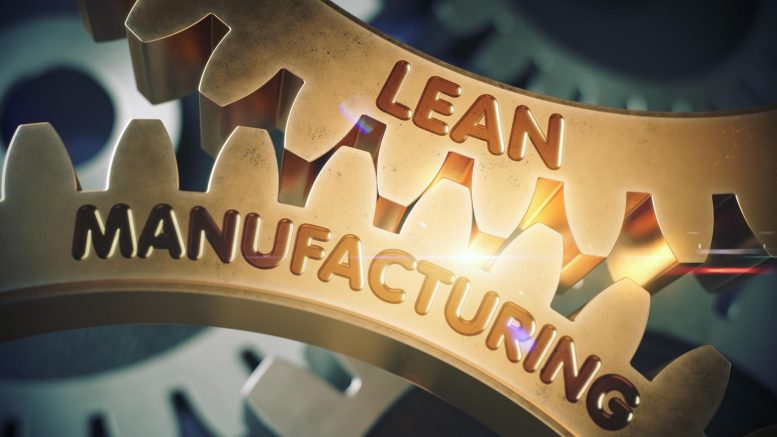Lean methodologies emerged in manufacturing and have now been applied to many business processes including innovation management (1). It is the latest “best practice” in manufacturing for process improvement alongside Six Sigma and Theory of Constraints (TOC). But if you are relying solely on the lean methodologies to provide a silver bullet for long term financial success, you are unfortunately fooling yourself.
First, an admission: I am wary of “best practices”. They tend to only be “best” for the company using them. It does not mean it is “best” for your company. Maybe it’s because I am naturally skeptical, or more likely that I have seen this play out with many other quick-fixes to fundamental business problems. Remember re-engineering?
All too often, senior management jump on the bandwagon of the latest concept being sold by consultants or in the popular business press. Why get left behind? While lean methodologies as applied to manufacturing (or innovation) certainly have validity, my basic argument is you need to look deeper and more thoughtfully at the problems your company faces. That is the responsibility of senior management and involves more than blindly following the crowd.
Perhaps my biggest frustration with this single-minded focus on lean comes straight from the Lean Enterprise Institute website concerning common mistakes in implementation (2). The answer: “…lean must never be seen as a tool for headcount reduction or mindless cost-cutting. This fundamentally misses the purpose of lean, which is to create value through elimination of waste.” Now you might suppose my issue is management’s propensity to use lean for mindless cost cutting, but you would be wrong.
My objection is the statement that lean is focused on the creation of value through waste elimination. While reducing waste and production efficiency are worthy of management attention, that should not be a higher priority than creating new products customers want to buy, will pay a higher price for and that generate increased margins. Improved manufacturing efficiency will surely improve the bottom line but doing that exclusive of innovation in new products will lead to long term business failure. You will “lean” yourself right out of business.
This unyielding focus on lean and efficiency in manufacturing can have other negative effects. I engaged with a manufacturing company several months ago to assess their innovation management practices. Senior management was very concerned with the quality of the new products recently released to the market.
It was not only negatively affecting their reputation with customers, but causing many other problems in manufacturing and the field support organization, who were bogged down with customer support issues.
As it turns out, the manufacturing organization was focused on implementing lean methodologies. They were being rewarded based on that effort. Engineering was justifiably frustrated that manufacturing personnel were not engaged with new products because they were too busy with the lean implementation. So while successfully implementing lean might appear on the surface to “increase value by reducing waste”, this company was setting the stage for long-term problems.
The mentality that reducing waste and becoming more efficient is the number one goal for a company also illustrates another issue facing many existing companies. Namely, the need to create new knowledge which provides the fuel for the innovation engine, and leads to successful and profitable new products.
Many existing companies fall into the trap of relying on their existing knowledge. In today’s world of hyper-competition and the fact that knowledge spreads quickly, what may be a competitive advantage today will not be tomorrow. Reliance on existing knowledge manifests itself in new products that are incremental improvements of existing products.
These are “efficient” projects. They are easier to manage and predictable. Taken to the extreme, a business thinks they are “innovative” by simply changing the shape, size and color of the packaging. It is much more difficult, riskier and less “efficient” to create new knowledge. Companies who will survive long term understand they have to do both: rely on existing knowledge to pay the bills and generate new knowledge that fuels innovation and future revenue growth.
Finally, a caution about over-reliance on lean as applied to innovation. As mentioned, the lean methodologies have made their way to new product development. We now talk about “flow” in relation to new product development (3). We have the “lean startup” methodologies (4). There are two fundamental opinions on how to create customer value.
One is an analytical approach. This is basically what the lean methodologies rely on. The other is more closely associated with creativity, vision, customer empathy and serendipity. It is a more intuitive approach. Jon Kolko writes about this topic in a recent Harvard Business Review article that argues the lean methodologies don’t always generate the best new products (5).
In summary, don’t rely exclusively on a lean manufacturing implementation to create customer value. In fact, I would argue eliminating waste and a focus on efficiency should be secondary to finding ways to create new knowledge that leads to products that customers will pay more for, that drive higher margins and leads to increased earnings. In creating new knowledge, use a balanced approach that incorporates both the lean methodologies and intuitive methods.
Notes:
(1) A good overview of lean methodologies can be found at the Lean Enterprise Institute website.
(2) See this page on the Lean Enterprise Institute website.
(3) Donald Reinertsen, The Principals of Product Development Flow (Redondo Beach, CA: Celeritas Publishing, 2009)
(4) Eric Ries, The Lean Startup (New York, NY: Crown Business, 2011)
(5) Kolko, Jon. May 14, 2015. Lean Doesn’t Always Create the Best Products. Harvard Business Review May, 2015.
 Jeff Groh is President of New Product Visions located in Flat Rock, NC. New Product Visions helps companies improve their innovation management practices. We focus on processes, organization, management engagement and culture. Services include consulting, Innovation Coach™ Workshops and software enablers. Mr. Groh spent 30+ years in industry in a variety of management roles in sales, manufacturing and new product development prior to starting New Product Visions. He is particularly passionate about the role of senior management and the culture that supports innovation success. For additional information or a no-cost on-line assessment of your company’s innovation management practices, email Jeff at jgroh@newproductvisions.com or by phone at (302)-367-3160. Available for select speaking engagements.
Jeff Groh is President of New Product Visions located in Flat Rock, NC. New Product Visions helps companies improve their innovation management practices. We focus on processes, organization, management engagement and culture. Services include consulting, Innovation Coach™ Workshops and software enablers. Mr. Groh spent 30+ years in industry in a variety of management roles in sales, manufacturing and new product development prior to starting New Product Visions. He is particularly passionate about the role of senior management and the culture that supports innovation success. For additional information or a no-cost on-line assessment of your company’s innovation management practices, email Jeff at jgroh@newproductvisions.com or by phone at (302)-367-3160. Available for select speaking engagements.


Leave a comment
You must be logged in to post a comment.